The therapeutic power of gardening: Advice from Thrive
Tags
DementiaInterviewsLiving well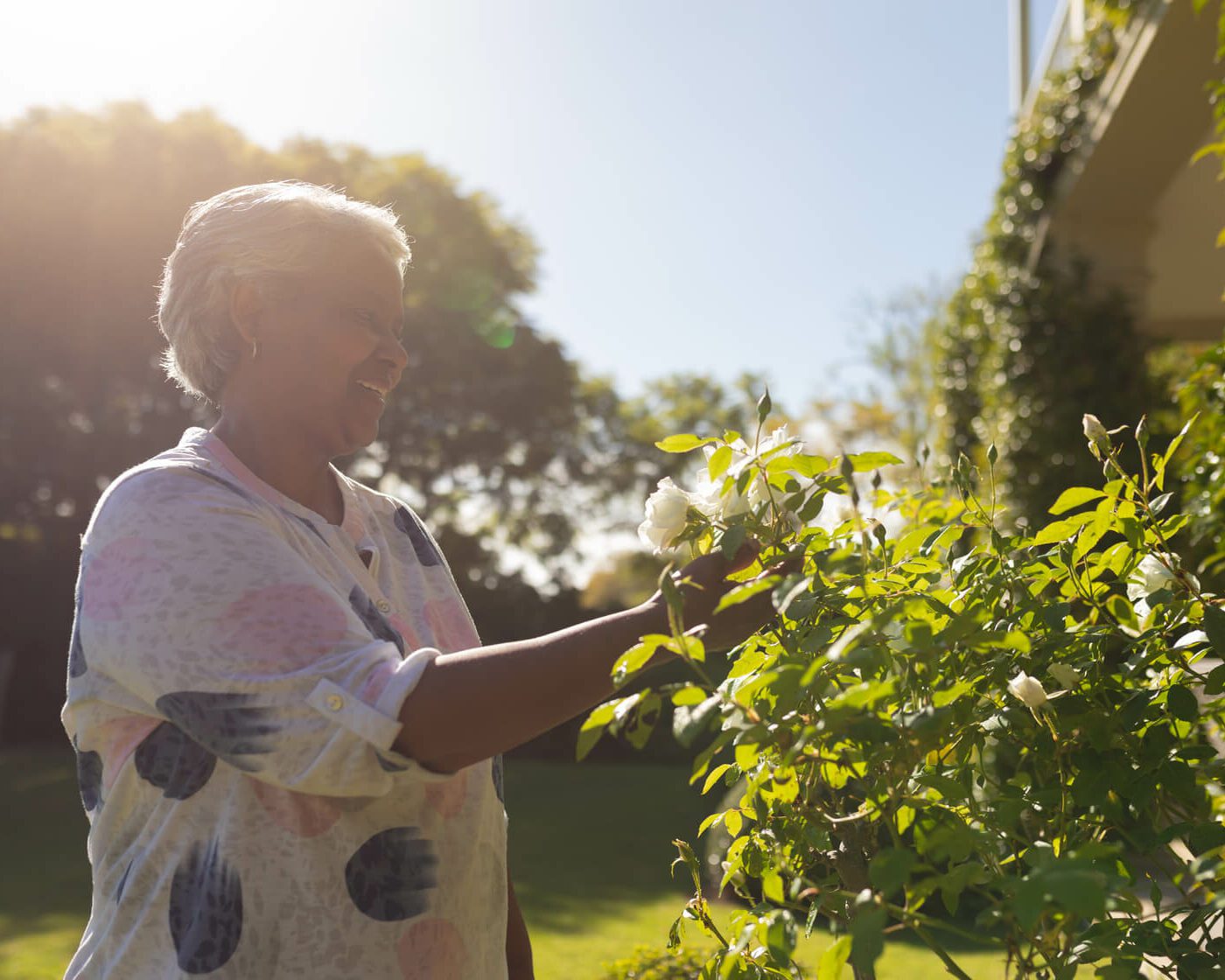
It probably won’t come as much of a surprise that spending time in the great outdoors is good for our health – numerous studies have shown that it can lower blood pressure, reduce stress and even improve self-esteem.
However, did you know that gardening and horticulture can come with its own set of wellbeing benefits, particularly for those who are older, or living with conditions such as dementia?
We asked Thrive – a horticultural therapy charity for their expertise.
At Thrive you use something called Social and Therapeutic Horticulture (STH). What are its principles, and why can they have such a profound impact on older people?
Social and therapeutic horticulture supports what older people can do, rather than what they can’t. Plants and gardens can be used to improve mental and physical health, as well as communication and thinking skills.
With STH, gardens are safe and secure spaces where individuals develop socially and learn practical skills that will help them to be more independent. STH taps into three key therapeutic opportunities, time in nature, time in a supportive social environment, and time being active and occupied.
The success of STH relies on a partnership between individual gardeners and Thrive STH practitioners. Practitioners devise active or passive activities in the garden that can help each gardener reach their individual goals. These goals might include improving physical fitness and strength, rebuilding mental health, or developing confidence.
What are some of the potential holistic benefits?
| Physical benefits | Builds muscle strength Improves balance Hand-eye coordination Improves motor skills Strengthens immune response Aids sleep Reduces blood pressure |
| Mental benefits | Reduces stress and anxiety Provides purpose Provides a sense of achievement Improves mood |
| Cognitive benefits | Aids concentration Stimulates memory Supports decision making Improves attention and engagement |
| Social benefits | Reduces isolation Improves social skills Provides a sense of belonging Opportunity to learn new skills |
Can gardening help older people deal with difficult emotions, such as the loss of a spouse, or loneliness?
In the right context, gardening can have a positive role in helping an older person cope with emotional upheaval or loneliness.
At Thrive, the social side of STH is very important – people work alongside each other in small groups, along with our practitioners, and this helps bring people together. Conversations open up more naturally, barriers come down and relationships are forged.
This approach is particularly helpful for people whose social skills or social confidence is lacking.
Spending time in a garden looking after plants is an immersive experience, one that requires focus and can take the mind off particular troubles too.
Also important are the times when the gardening stops. Tea breaks and lunchtimes reinforce social connections, and the gardens at Thrive are inherently social places – there’s a lot of conversation and laughter.
As a result of the pandemic, did you see people’s connections to gardens shift, and if so, how?
At Thrive we’ve seen indications that the value of gardens and green spaces for people’s health and wellbeing has increased during the pandemic. Lockdowns gave people more opportunity to spend time in their gardens and feel better for it.
The horticultural industry estimates 3 million people took up gardening in the UK during the pandemic. With the uncertainty of Covid-19, gardens have provided an element of structure, control and routine for people.
Beyond the therapeutic programmes in our own gardens, Thrive offers a national information service to help people garden whatever their abilities. We saw a wave of interest in how to garden and how looking after plants can help health and wellbeing, and as a result of the pandemic, we created a Gardening Club specifically to help people enjoy the benefits of their gardens – providing weekly how-to guides so they could navigate horticultural basics.
We also saw increased interest in people joining our STH programmes to improve their health and wellbeing, as well as a rise in those who were wanting to volunteer in our gardens.
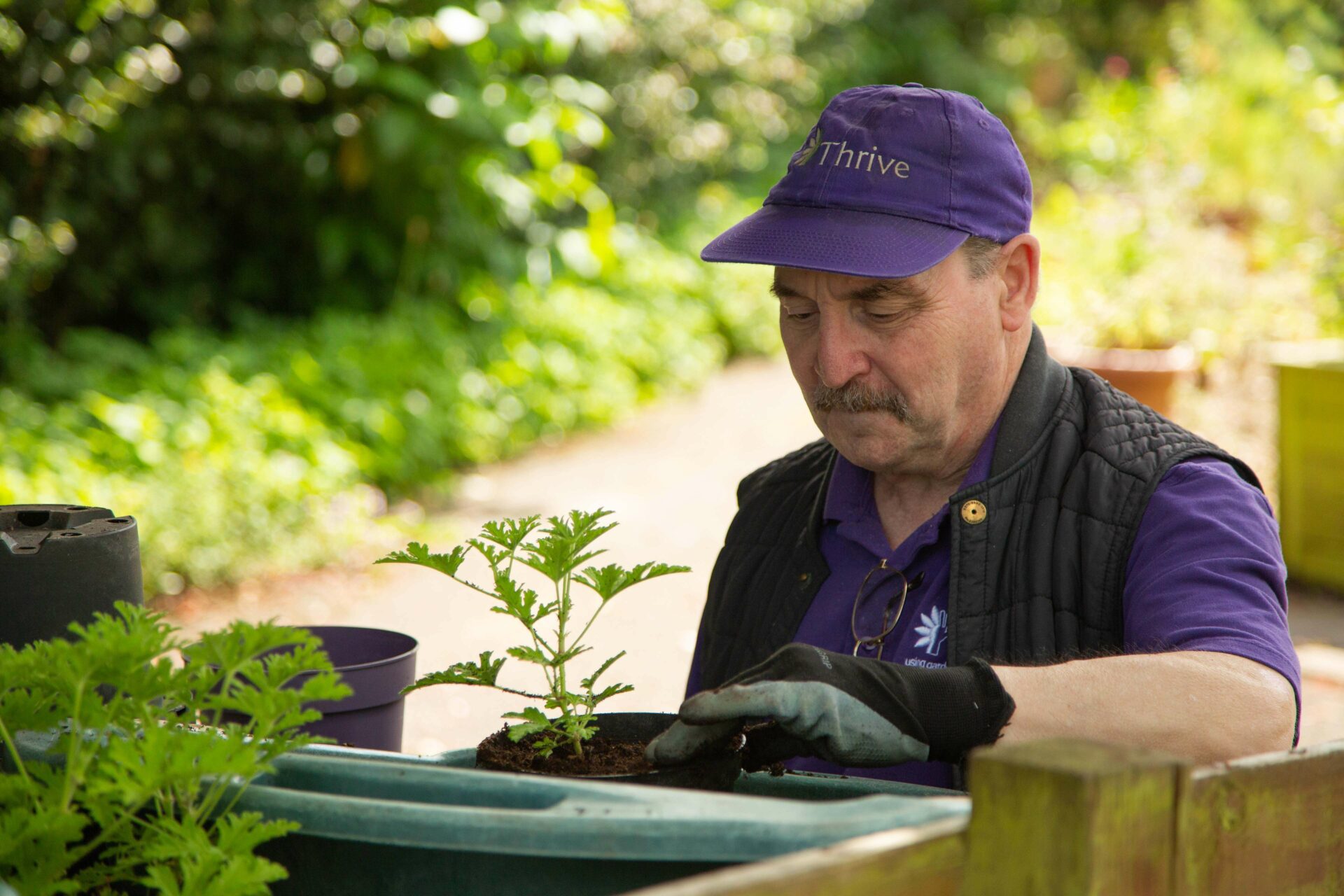
What do you think are the key benefits of gardening for those living with early to mid-stage dementia?
For many people, gardening is something they can easily relate to because it’s been a part of their lives for a long time. We often hear how a love of gardening starts at a young age through older family members.
These memories can make gardening more accessible than other activities for people with early to mid-stage dementia. And, while memories of gardening can fade, activities often create positive feelings that last long after sessions have ended.
It’s also well recognised that gardening can reduce stress, anxiety and depression, but caring for plants aids people cognitively, encouraging responsibility and decision-making too.
For people with dementia who come on our STH programmes, gardening offers social connection with others, the opportunity to do a meaningful activity and the therapeutic benefits of time in nature.
There’s also research indicating that gardening can change patterns of behaviour with reductions in aggressive behaviour, pacing, trespassing and incontinence.
There’s a lot to learn when it comes to gardening. How do you make it an accessible and enjoyable hobby for older people with little or no experience?
With more than 400,000 species of plants, gardening can seem daunting when first starting out. But like many things, it pays to start small and build slowly. Plants and gardens evolve over time and beginners should be realistic in their expectations.
At Thrive, we tailor activities according to a person’s experience, abilities and desires, with our practitioners providing instruction and guidance. Activities that produce quick results are often helpful for people starting out – giving them a sense of achievement and satisfaction that increases their motivation to garden. Growing microgreens, for example, can produce results in days.
To increase accessibility, we have adapted tools that can be used to help people who have physical limitations.
We always stress to people starting out the importance of not overdoing it. If someone isn’t used to gardening, short bursts are better than long stints. Taking regular breaks is important not only to rest but also to ensure you have time to enjoy the gardening space, because that has therapeutic benefits in itself. Rome wasn’t built in a day and there is always tomorrow.
One of the great advantages of gardening is you don’t need a host of expensive tools and equipment when starting out. Also, free advice and information is readily available, not just on Thrive’s website but on many others.
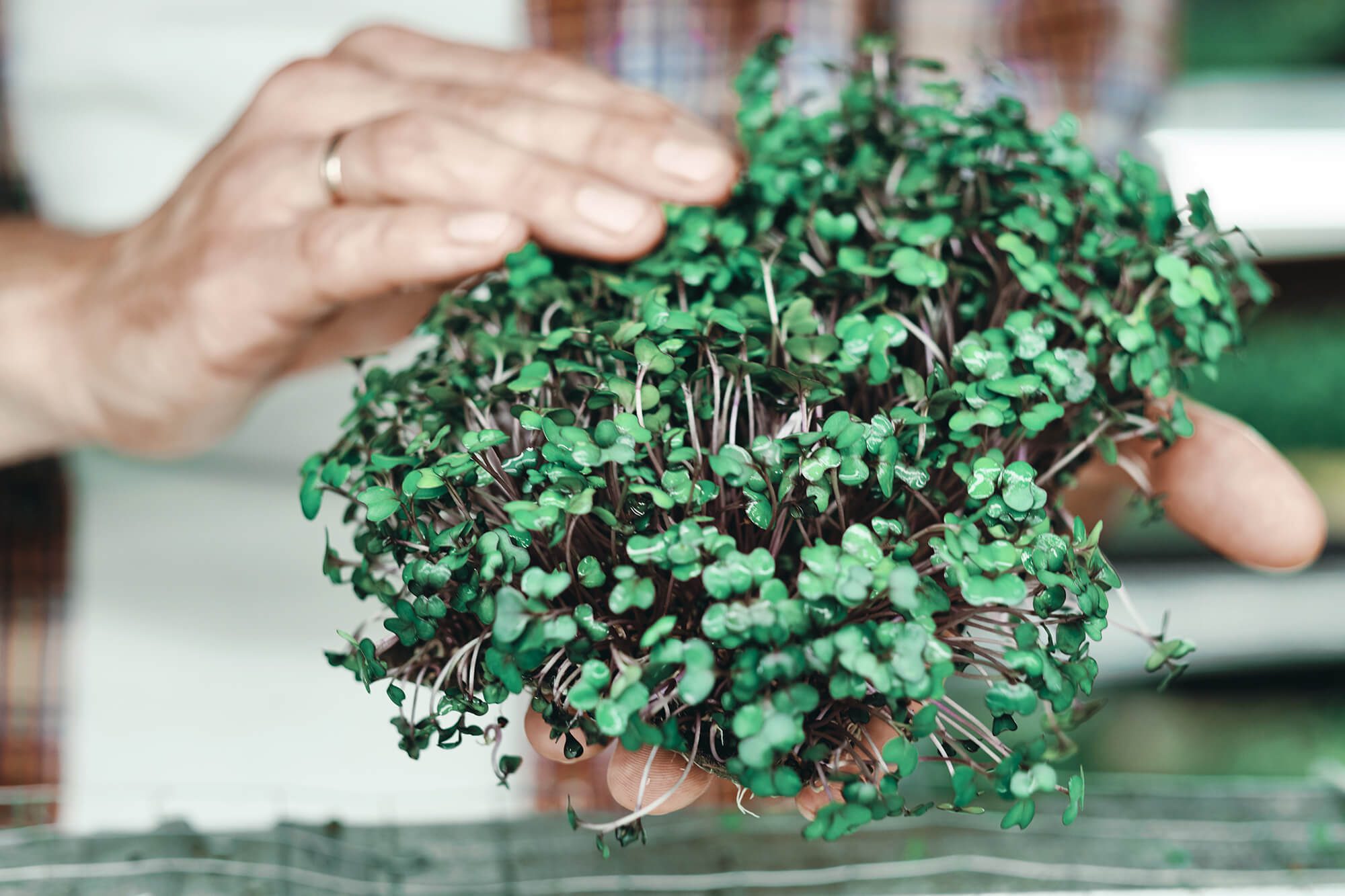
Microgreens, such as cress are fast growing, and can be satisfying for those who are new to gardening.
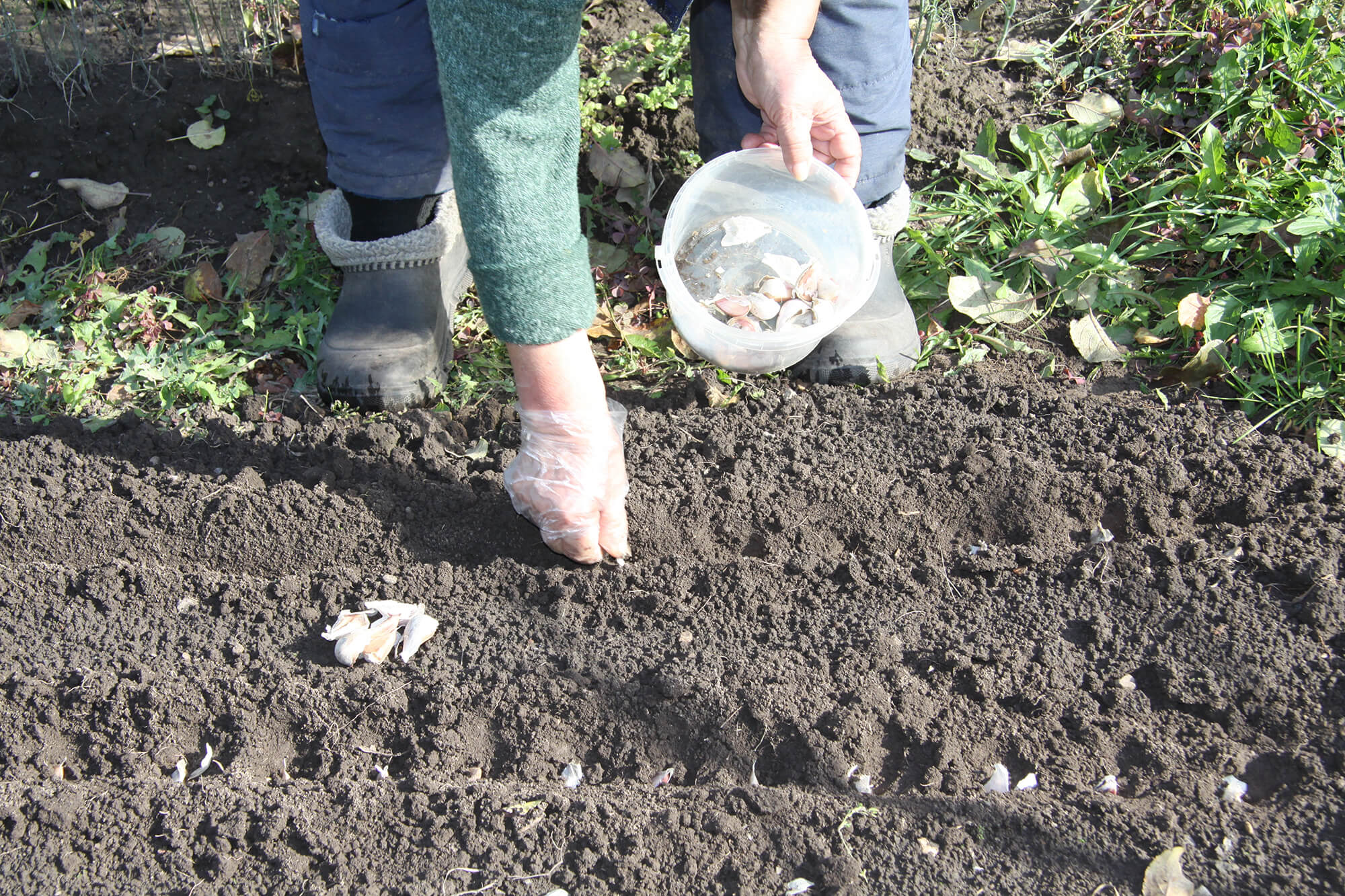
You don’t need to spend a lot of money on specialist tools to get enjoyment out of gardening.
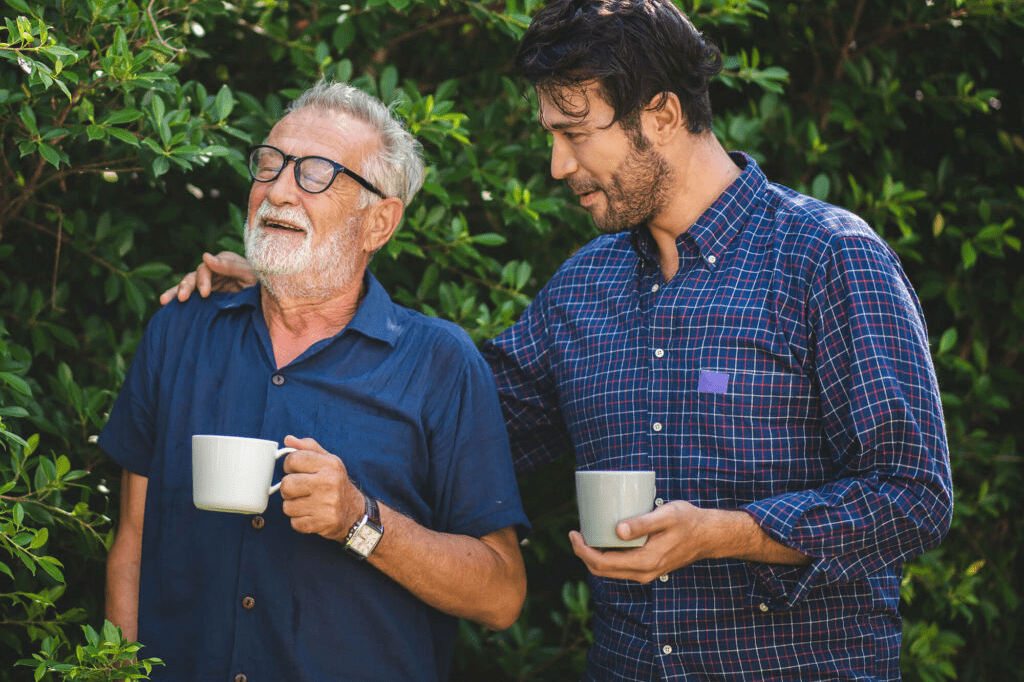
Taking breaks to take in nature is just as important as gardening itself.
What steps can caregivers take to support older people in the garden? Especially with spring around the corner?
There are many simple gardening activities that are accessible and can get people into gardening. Spring is an ideal time to begin with sowing and planting.
Thrive’s website has step-by-step gardening guides which also detail the health and wellbeing benefits of activities, as well as instructions on how to do them and what materials and tools might be needed.
For people with a disability or health challenge, Thrive’s Carry on Gardening website has a wealth of information, tips and resources tailored to their needs.

Thrive runs a wide range of horticultural therapy programmes for older adults at its centres in Birmingham, London and Reading. The charity’s aim is to remove barriers so people can experience the health and social benefits of gardening, and achieve their own goals. For older people, these goals can include things such as staying fit and active, or connecting with people while doing something meaningful and worthwhile.
Read our latest interviews
Browse our latest interviews, and research on elderly living, from leading national experts.